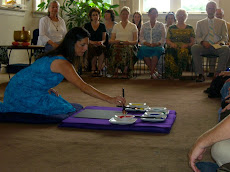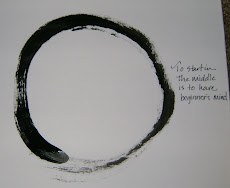I've been thinking about the title of my thesis. I have tried very hard to be open-minded about my thesis topic and its title, ever since I started tossing the idea around in my head last spring. Part of me has felt resistant to changing it, but for what reasons(s) I am not sure. It's a great topic, to be sure. It's a vast topic, of that I am even more sure.
The other day, this thought came to me as a thesis title: Ritual: a Path to Cultivating Community, Connection, and Compassion (in and out of the classroom). I am drawn to the word "cultivating." I am attracted to the verb, to the consciousness of the doing. Ritual has to do with meaning. It has substance and purpose. It is alive.
Here is how freedictionary.com defines "cultivate":
tr.v. cul·ti·vat·ed, cul·ti·vat·ing, cul·ti·vates
1.
a. To improve and prepare (land), as by plowing or fertilizing, for raising crops; till.
b. To loosen or dig soil around (growing plants).
2. To grow or tend (a plant or crop).
3. To promote the growth of (a biological culture).
4. To nurture; foster.
5. To form and refine, as by education.
6. To seek the acquaintance or goodwill of; make friends with.
The rituals I have incorporated into my personal life, as well as my classroom practices, do "nurture and foster." They do "form and refine." They do help "to seek the aquaintance or goodwill of; [and] "make friends with." Like the definitions that apply to the land and plants - ritual does help to "improve and prepare," "to loosen and to dig," "to grow or tend," and rituals do "promote growth."
The "deeper learning" that I have been referring to in my working title - and exploring in my work - actually seems to fall under the heading of "connection." When one learns deeply, one can connect to material/subject matter, to other, to self, to community, and/or to the greater world.
The cultivation of community (also a form of connection) and compassion (another form of connection, really) has been an integral part of my use of, and exploration of, ritual.
In William Shakespeare's Romeo and Juliet, Juliet wonders:
What's in a name? That which we call a rose
By any other name would smell as sweet.
(Act II, sc. ii)
There isn't much in a name, really: we call a table "table," but we could just as well call it "goomba," or give it any other name and it would still remain the same object and serve the same function(s).
Romeo and Juliet could have been called "Earl and Henrietta," and it wouldn't change the story. But, seriously: what sounds better? "Earl and Henrietta" - romantic? Hmmm....me no think so. Therefore, a name is important to some extent. And so is the title of my thesis - if for no other reason to help me and whomever reads it, to be more clear about my exploration of ritual.
I have just given myself some more "food for thought" - especially with the definitions I found for "cultivate." More work for me? No doubt. Exciting none-the-less? You bet.
Lizard Coloring Page
2 years ago





No comments:
Post a Comment